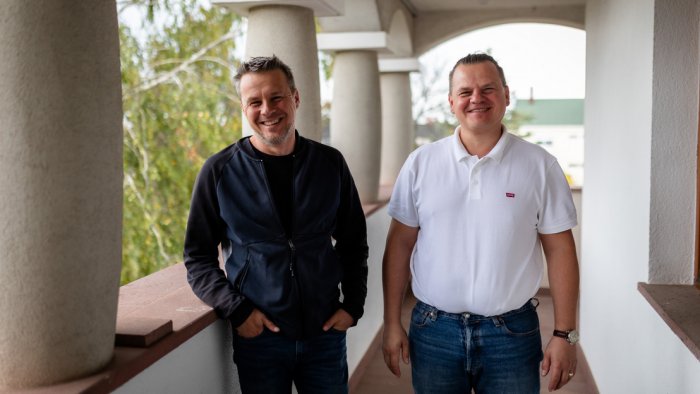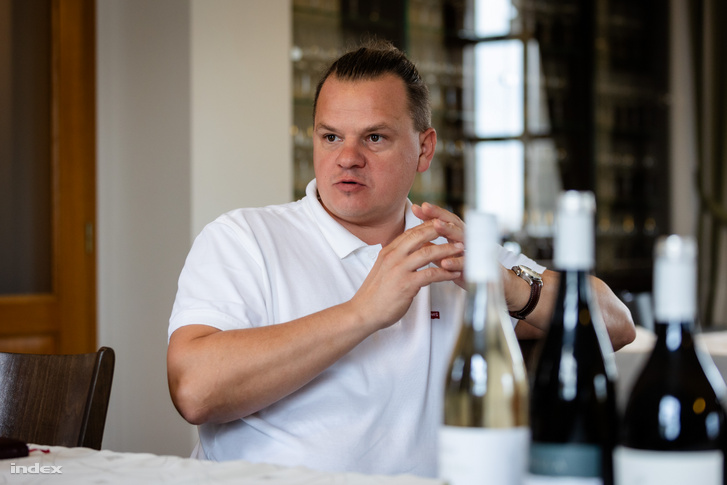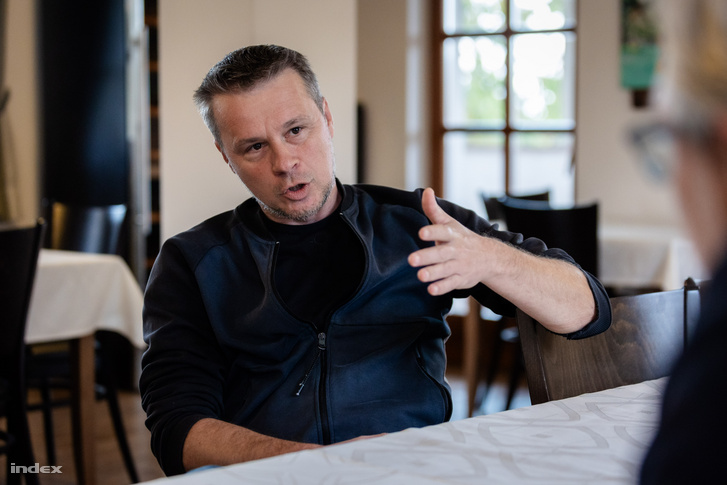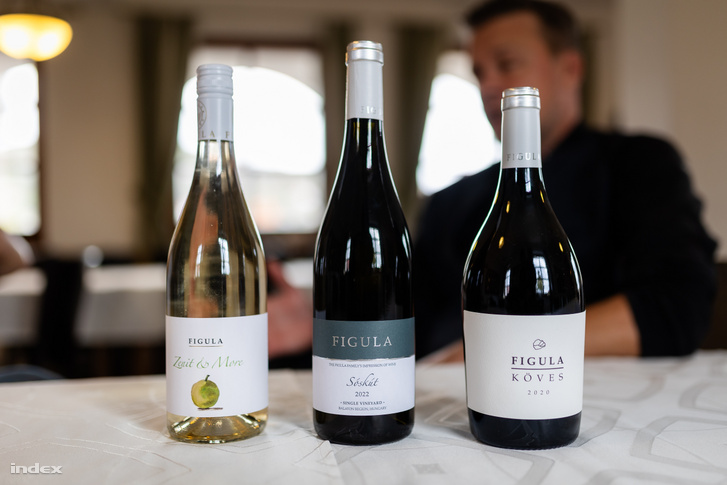Hírek
THE CO-OWNER OF THE FIGULA WINERY IN FÜRED WANTS AGGRO2024-03-04
Interview with Mihály Figula and János Figula at Index.hu

The co-owner of the Figula Winery in Füred wants aggro
György Vig

In front of the fragrant cellar of Figula Pincészet in Balatonfüred, full of Hungarian oak barrels waiting for new wine, Mihály Figula Jr. begins the conversation by saying that this interview should be scandalous. He is not afraid of "mischief" - he declares, while behind him Lake Balaton glistens gently from the autumn sunlight - and therefore he says publicly that he has no desire and no reason to complain. Then his brother, János Figula, arrives and tells them why they feel that the glass is always at least half full.
For the Figula brothers, for example, family is important. They are proud of the fact that they come from a Nyírség family on their father's side, with teacher ancestors. According to János, their father, Mihály Figula, chose a university after graduation by looking at which one was greener. He found that the park around the University of Horticulture in Budapest was the most beautiful, so he applied there.
At the university, he met his future wife, the future mother of the Figula boys, who comes from a deep-rooted family in Balatonfüred. They have lived from agriculture for several generations, and the crown jewel of their economy has always been grapes and wine. Before the war, they were considered a well-to-do family, then socialism came, and everything, except for a narrow plot, became the property of the working people after it was taken from them.
For the newlyweds, Füred has always been the real home, and after family, grapes are their greatest love. Both János and Mihály believe that their parents' diligent work and realistic vision of the future paved the way for them as well.
NEITHER QUIET NOR LOUD COMPANION
"Here there was no extra capital, no partner, neither quiet nor loud. Only the two of them have a clear understanding of the situation and their maximum commitment to quality," states Mihály. Then he tells how it became possible for them to farm on thirty hectares of vineyards in and around Füred today:
"There was no way around it. They simply said that it is necessary to make high-quality wine from the place of origin, this is the basis of everything, and we will continue on this path with Jancsi. Unfortunately, my father died in 2008, but our mother is still a strong support in our professional and family matters."
"Here on the hill, there was a small vineyard left, and we slowly bought the rest - continues János. - We built gradually, later we also bought the basement of the Reformed church. We put everything in order that belongs to us, for which we feel responsible. We bought a number of unprotected old buildings so they wouldn't be torn down. We recultivated production areas in the border of Füred, Szőlős, Pécsely, old family areas, which we knew produced good grapes there.
WE BUILT THE PROPERTY THAT HAD BEEN IN THE FAMILY ONE HUNDRED YEARS AGO AS PROPERTY."
János also tells why the knowledge of their parents and grandparents is still important to them today:
Today it is very fashionable to talk about fast-growing, research-oriented companies. This doesn't really work in winemaking. Five thousand years ago, wine was fermented just as it is today, so you have to rely on tradition. There is nothing to discover here, you have to work, incredibly precisely, and experience is the greatest value.
They themselves went out to the vineyard from a young age. At that time, they still had relatively little land, which the family cultivated themselves.

János Figula
Photo: Péter Papajcsik / Index
During the first harvests in the early '90s, the bunches were still picked by the father, mother and children. János, who graduated from ELTE with a degree in Hungarian-aesthetics, then graduated in percussion at the Music Academy in Graz, also admitted that as a teenager there were parts of this that were pregnant for them. For example, their friends went to the beach in the summer, and they went to the vineyard, which is obviously not a perfect situation for a teenager.
HEALTHY VIRUS
"I used to say that the whole thing is like a virus in a positive sense, if you want it, if you don't, you catch it. In such a family there is no escape from the love of grapes and wine. "You may deny it from your gut for a while, thinking that what your father and mother do, you certainly don't do, but then it turns around," states János.
Even today, viticulture, which requires a lot of manual labor, is not an easy career. Mihály expresses this very plastically:
Gone are the days when you walked into a pub, blew a whistle, and the next day twenty people came to harvest. That's the end of it, you won't find casual workers at Balaton.
Fourteen permanent employees work in their company, including the three of them and their mother. They try to gather around them people who see the company not as a simple workplace, but as a place for serious creative work, in which they can participate themselves.
According to János, their employees are strongly motivated by the company's domestic and international successes. They also constantly discuss where the wines they make go. Their common goal is to create outstanding quality, and, as he says, there is no limit to quality in wine.
SAD INCENSE AND HAPPY DRINK
When I ask if it's so good to be a Hungarian winemaker today, then why read and hear stories about serious professionals who leave the country because they can't make it at home, the literary man in János wakes up and answers the following:
It's like when Sándor Weöres and Amy Károlyi were asked what is the secret of being married for forty years. They answered: maybe it's because we took it seriously.
According to him, you can give up anything, but people who start something and stop it after ten years are told that they have come and gone. "Our family has lived here for at least three hundred years. Quitting is not an option for us, just like divorce is not an option."
Mihály complements his brother's thoughts by saying that you simply have to believe in what you do. Of course, they also have difficulties, but their company was never on the verge of going out of business.
"THE MOST IMPORTANT THING IS THAT WE ARE FOR THE WINES, WE DON'T LIVE FROM THE WINES.
We always strive for the best quality, just like our great-grandfather did. This has to be taken seriously and done," he says, and then, for the sake of the promised mishap, adds that he doesn't understand whose interest it is to question professional values from time to time.

Figula Mihály
Mihály, returning to his favorite topic, tells his ars poetic:
"The kind of life affirmation that wine, wine culture, and food need, is one of the cornerstones of quality living. That's why Jancsi and I say that everything is fine. Our company is working well, our colleagues are happy.
PEOPLE LIVING IN OUR ENVIRONMENT WHO CONSUME GOOD FOOD AND GOOD DRINK ARE ALSO HAPPY.
From here in Balatonfüred, I can't decipher whose interests it is to communicate bad things about the wine industry. Wine is not meant to put each other down, to make us feel bad. It's a fun drink.”
Here I ask how this merry company divides the work. They say that József Feil - whom Mihály befriended when he was a freshman - is responsible for the cultivation of the thirty-hectare vineyard. The final quality is 90 percent a viticultural issue. Mihály and Antal Szakács' area is all winemaking work up to bottling, while János mostly manages the way of finished products, including all kinds of trade and hospitality.
Their mother is still at the head of the organization, who manages the team with the temperament of an Italian mamma. Larger volume decisions are made jointly.
According to János, the fact that the family works together has more advantages than disadvantages. Big arguments are not uncommon with them either, but he is still happy that his brother is also his colleague. If nothing else, it's because they talk at least eight or ten times a day, even on the phone, which few siblings can say about themselves.
THE HEALING SOUL OF WINE
Mihály nods, because he believes that good wine not only brings families together, but also society.
"Where the wine is good and where the wine culture works, there are also wild people who sit down to talk about world affairs. We could list the Portuguese, the South of Latvia, the Spanish, the South of France, the German of the Rhine, where you go and you feel like, hey, it can be like that? Well, how could it be. All that is needed is the special effect of wine, which is not the alcohol, but the spirit that it carries in itself."
He is convinced that at all levels of society we must respect each other with hospitality. According to him, no one can give out bad coffee, a bad glass of wine or bad fried meat. To put it more strictly:
You have no right to do this, it is your duty to dazzle the guest who comes to you, compared to your own possibilities.
He sees that this requires pride, that we should be prouder of who we are. He is convinced that we have all the resources to make this country a tourist paradise in terms of winemaking, gastronomy and beauty. According to him, this would be easy to do because we have everything for it.
"If we couldn't achieve this, then our children could rightly say that we weren't able to do it," he adds.
János outlines the company's professional concept. He says it's easy as a stick, as they basically produce three types of wine:
1. Mountain wine, which means that the fruit of several vineyards goes into the bottle,
2. Vineyard wine, for which the fruit of a single vineyard is used, where the character and unique taste of the place of production is reflected in the wine from that place.
2. The crown jewel of the whole is the parcel level, where you will find an even smaller unit within the vineyard. This can be as little as 0.7 hectares within a 5-hectare area.
Viticulturally they look for them, oenologically they prepare the special values, and if they find something extra, they show it to the world. And they look for special, unique things in the world.
THE WORLD LOVES LITTLE, IF IT'S GOOD
"Hungarian wine is unique and special," explains János. – So our concept can be extended to the entire domestic wine production. That way, you don't have to stick to standards, you don't have to supply various merciless big store chains, because everyone knows that that's all there is to it. Which, if it's good enough, can get into the world's best restaurants."
Their own example also proves this. On an international level, they were greatly boosted by the top gastronomy in Budapest, where 80 percent of the guests are foreigners. They bring the fame of Hungarian wine to the world, and it is thanks to this that they managed to reach France, the Scandinavian market and even Italy with their wines, among others.
In cool Hungarian places, of course, you can't get on the drinks list on a friendly basis, quality is the only recommendation there.
A Stand, Wine Kitchen or Babel cannot afford to keep uninteresting wines, János lists. - Great wine creates a strong moment in Budapest and Tokyo for those who taste it. If you know less than that, you cannot succeed in such places.
The winery's top wine is a 2016 Köves, which received 97 points out of 100 at the Decanter World Wine Awards in London. The treasure of the Köves parcel is always a blend based on Italian Riesling, now typically with furmint. Both are traditional varieties of the wine region around Füred. They already installed the furmint, which disappeared from the area for several decades. It is quite a delicate variety, it is difficult to work with it viticulturally.

Photo: Papajcsik Péter / Index
WE ALL HAVE A GLASS OF WINE
Although his brother is a writer, Mihály also talks about this topic with poetic fervor:
"It is made with the same exactingness as Köves, so with the same honesty, purity, and obsession. But it's a light, fresh, fruity port that you don't need to prepare or tune into. This is a glass of fine wine. We're all glasses of wine. And I think this should be the case for every winery."
When I ask Mihály, who won the title of winemaker of the year from the Hungarian Wine Academy last year, what he thinks a good wine should be, he doesn't say anything about acidity, southern fruit finish and C minor aftertastes, but simply says: it should be delicious.
The wine should not be full-bodied, dense, carbonated or light. The wine should be delicious. Because if it is, I'd like another glass of it
he says.
In the name of hospitality and to popularize good wine, they also operate the Wine Terrace, where 5-7 thousand guests come every year and more than 300 wine tastings are held. So there is one of these almost every day.
Mihály, the great local patriot, who already feels homesick for Csopak after leaving Füred, selflessly emphasizes that there are colleagues in all parts of the country who think about grapes, wine, and hospitality in roughly the same spirit as they do.
"In this country, only those who don't want to feel uncomfortable. And in this country, only those who don't want to produce good wine don't produce good wine, because here we have everything," he says in conclusion, because he insists on the scandalous statements he promised at the beginning of the conversation.
This sponsored editorial content was created with the cooperation of Best of Balaton.
(Cover photo: Mihály Figula and János Figula on October 31, 2023. Photo: Péter Papajcsik / Index)